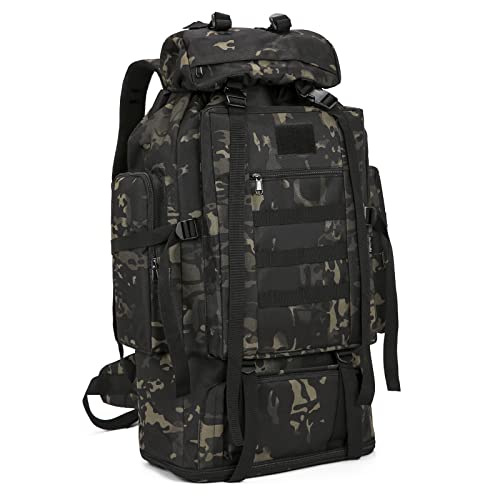Hiking backpacks come in various capacities, catering to different trip lengths and gear needs. Choose based on your hiking duration and gear requirements.
Selecting the right hiking backpack capacity is crucial for a comfortable and successful hiking trip. Daypacks, with capacities of 15-30 liters, are ideal for short hikes and carrying essentials. For overnight trips, a 30-50 liter backpack provides ample space for extra clothing and gear.
Multi-day hikes require 50-80 liter packs to accommodate camping equipment, food, and additional necessities. Larger packs, exceeding 80 liters, are best for extended expeditions or carrying specialized equipment. Understanding your trip’s demands helps you choose the appropriate backpack size, ensuring you can carry everything you need without overburdening yourself. Proper backpack selection enhances your hiking experience, providing comfort and convenience.
Buying Guide On Hiking Backpack By Backpack Capacity
**buying guide: hiking backpack by backpack capacity** 1. **understanding backpack capacity** grasping the concept of backpack capacity simplifies choosing the right hiking backpack. Measured in liters, capacity indicates the volume available for gear. Smaller capacities suit short trips, while larger ones accommodate extended adventures.
2. **choosing a daypack (10-30 liters)** daypacks, ranging from 10 to 30 liters, are ideal for short hikes. They provide enough space for essentials like water, snacks, and a first-aid kit. Lightweight and compact, these packs ensure comfort during day trips.
3. **opting for a weekend pack (30-50 liters)** weekend packs, with capacities between 30 and 50 liters, cater to overnight or weekend hikes. They can hold additional gear such as extra clothing, a sleeping bag, and food supplies. Consider these packs for multi-day trips without heavy loads.
4. **selecting a multiday pack (50-70 liters)** multiday packs, offering 50 to 70 liters, are designed for trips lasting several days. These backpacks accommodate more gear, including larger sleeping bags, cooking equipment, and extra clothing. Perfect for extended hikes, they balance capacity and comfort.
5. **choosing an expedition pack (70+ liters)** expedition packs exceed 70 liters, making them suitable for long trips or winter hikes. They carry heavy loads, including bulky gear and ample supplies. Opt for these backpacks for challenging, gear-intensive adventures. 6. **evaluating backpack features** consider features like compartments, hydration compatibility, and ventilation.
Multiple compartments aid organization. Hydration bladder compatibility ensures easy access to water. Proper ventilation enhances comfort during long hikes. 7. **testing comfort and fit** prioritize comfort and fit when selecting a backpack. Adjustable straps, padded shoulder straps, and a supportive hip belt distribute weight evenly.
Test the backpack fully loaded to ensure it feels comfortable. 8. **material and durability** durable materials withstand rough terrains and harsh weather. Look for water-resistant or waterproof fabrics. Reinforced stitching and strong zippers add to the backpack’s longevity. 9. **weight of the backpack** lightweight backpacks reduce the overall burden.
Consider the empty weight of the backpack. A lighter backpack enhances comfort, especially on long hikes. 10. **budget considerations** set a budget before shopping. High-quality backpacks vary in price. Balance cost with features and durability to find the best value. 11.
**reading reviews** researching reviews provides insights into real-world performance. Check feedback from other hikers. Their experiences highlight the pros and cons of different models. 12. **brand reputation** reputable brands often offer better quality and customer service. Research brands known for durable, comfortable hiking backpacks.
Reliable brands ensure a worthwhile investment. 13. **environmental considerations** eco-friendly backpacks made from sustainable materials minimize environmental impact. Choose brands committed to ethical manufacturing practices. Contributing to environmental conservation adds value to your purchase.
Conclusion
Choosing the right hiking backpack by capacity is essential for a successful outdoor adventure. A well-selected backpack ensures comfort and efficiency, whether you’re on a day hike or a multi-day trek. Remember to consider the duration of your trip, the gear you need, and your personal comfort preferences.
Smaller capacities are perfect for short trips, while larger ones cater to extended excursions. Always prioritize quality and functionality over aesthetics. Test your backpack to ensure it fits well and supports your load. Investing time in finding the right backpack can make your hikes more enjoyable and less strenuous.
Happy hiking!














